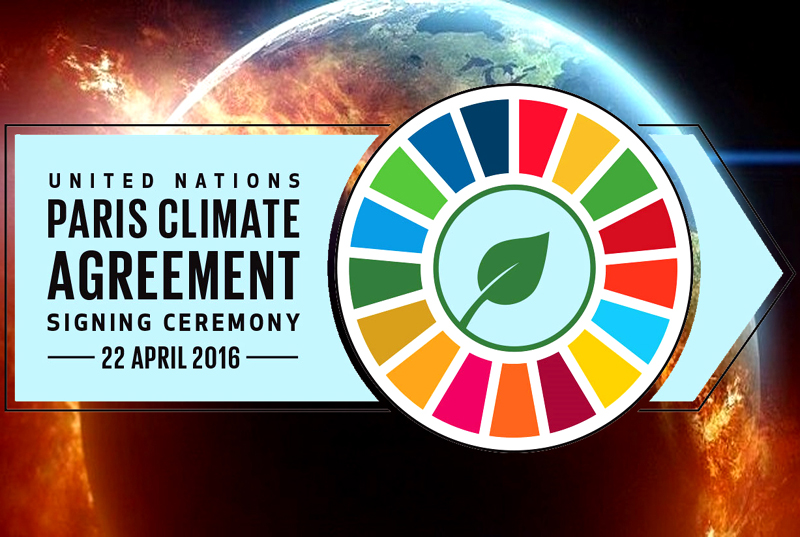 Dharamshala – The two friends and Nobel Peace Prize Laureates His Holiness the Dalai Lama and South African Archbishop Desmond Tutu, joined a group of 250 faith leaders from around the world, signed an Interfaith Climate Statement, urging nations to sign on to the Paris climate agreement and called for scaling up ambition to combat climate change.
Dharamshala – The two friends and Nobel Peace Prize Laureates His Holiness the Dalai Lama and South African Archbishop Desmond Tutu, joined a group of 250 faith leaders from around the world, signed an Interfaith Climate Statement, urging nations to sign on to the Paris climate agreement and called for scaling up ambition to combat climate change.
Ahead of the Paris Agreement Signing Ceremony at the United Nations Headquarters on 22nd April 2016, as religious and spiritual leaders, we stand together to urge all Heads of State to promptly sign and ratify the Paris Agreement.
Leaders belonging to the Buddhist, Christian, Hindu, Jewish, Muslim, Sikh, and other faith have signed on, "We as faith communities recognize that we must begin a transition away from polluting fossil fuels and towards clean renewable energy sources," the leaders said in the statement.
Emphasising each person's "moral responsibility" to care for our shared Earth, the Statement was submitted to the UN climate chief Christina Figueres in New York, Monday, April 18, 2016.
The interfaith statement was signed by leaders of the world's major religions, including Christianity, Islam, Juddhism, and Buddhism, and comes ahead of the gathering of international leaders at the United Nations on April 22nd, to sign the landmark climate pact agreed in Paris.
The statement begins, "Caring for the Earth is our shared responsibility. Each one of us has a 'moral responsibility to act,' as so powerfully stated by the Pope's Encyclical and in the climate change statements by Buddhist, Christian, Hindu, Jewish, Muslim, Sikh, and other faith leaders."
"Humanity is at a crucial turning point. We as faith communities recognize that we must begin a transition away from polluting fossil fuels and towards clean renewable energy sources. It is clear that for many people significant lifestyle changes will have to be made. We must strive for alternatives to the culture of consumerism that is so destructive to ourselves and to our planet."
"We must reflect on the true nature of our interrelationship to the Earth. It is not a resource for us to exploit at our will. It is a sacred inheritance and a precious home which we must protect. United with the shared hope that arises from faith, we the undersigned believe that the means, desire, and will to care for Earth and all life can and will become action as our political leaders ratify the promises made in Paris – and thus safeguard the greater promises of this generation and of all those to come," the statement concludes.
A record number of countries are set to sign the Paris agreement, accordingly scheduled on Earth Day, making the agreement a historic step in climate action.
The Statement was signed by 270 high level faith leaders, 176 different groups and more than 4000 individuals.
Six Key Points within the Interfaith Climate Change Statement:
- Urge governments to rapidly sign, ratify and implement the Paris Agreement, and to increase pledges to reduce emissions in line with keeping the global temperature rise to 1.5C above pre-industrial levels;
- Insist on rapid emissions reduction and peaking by 2020, in order to keep the 1.5C goal within reach;
- Strongly advocate for greater flows of finance, especially for adaptation and loss and damage;
- Urge the swift phase out of all fossil fuel subsidies and a transition to 100% renewable energy by 2050;
- Encourage faith communities to reduce emissions in their homes, workplaces and centres of worship and to support and stand in solidarity with communities already impacted by climate change; and
- Call for fossil fuel divestment and reinvestment in renewables and low carbon solutions, including within our own communities, and/or by engaging companies on climate change.


![Tibet has a rich history as a sovereign nation until the 1950s when it was invaded by China. [Photo: File]](/images/stories/Pics-2024/March/Tibet-Nation-1940s.jpg#joomlaImage://local-images/stories/Pics-2024/March/Tibet-Nation-1940s.jpg?width=1489&height=878)

















